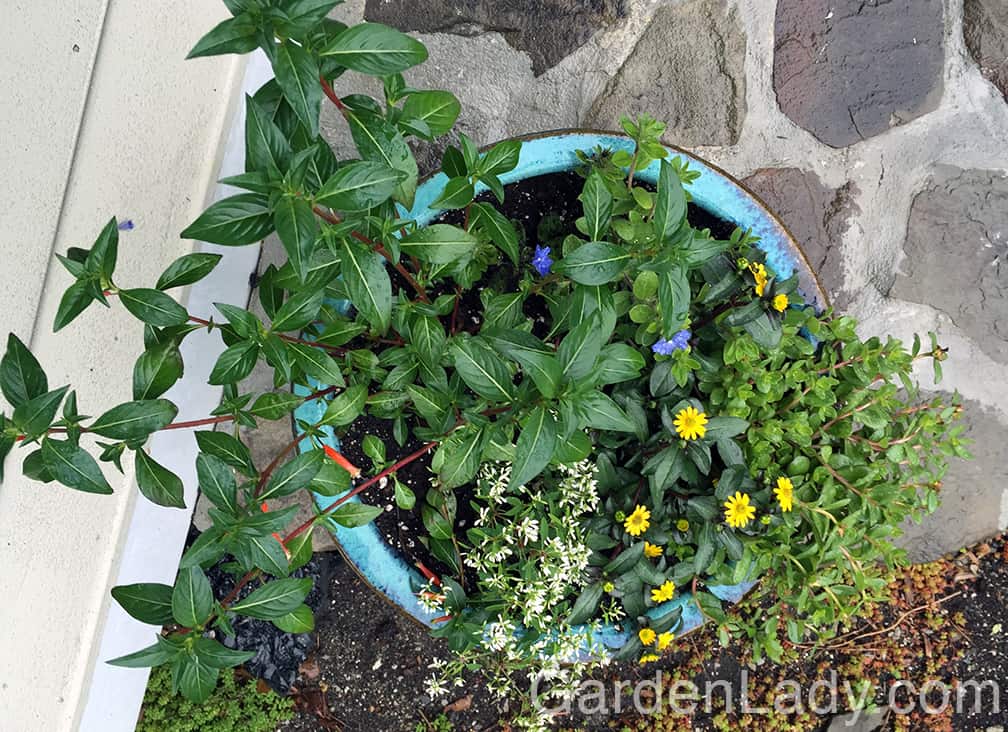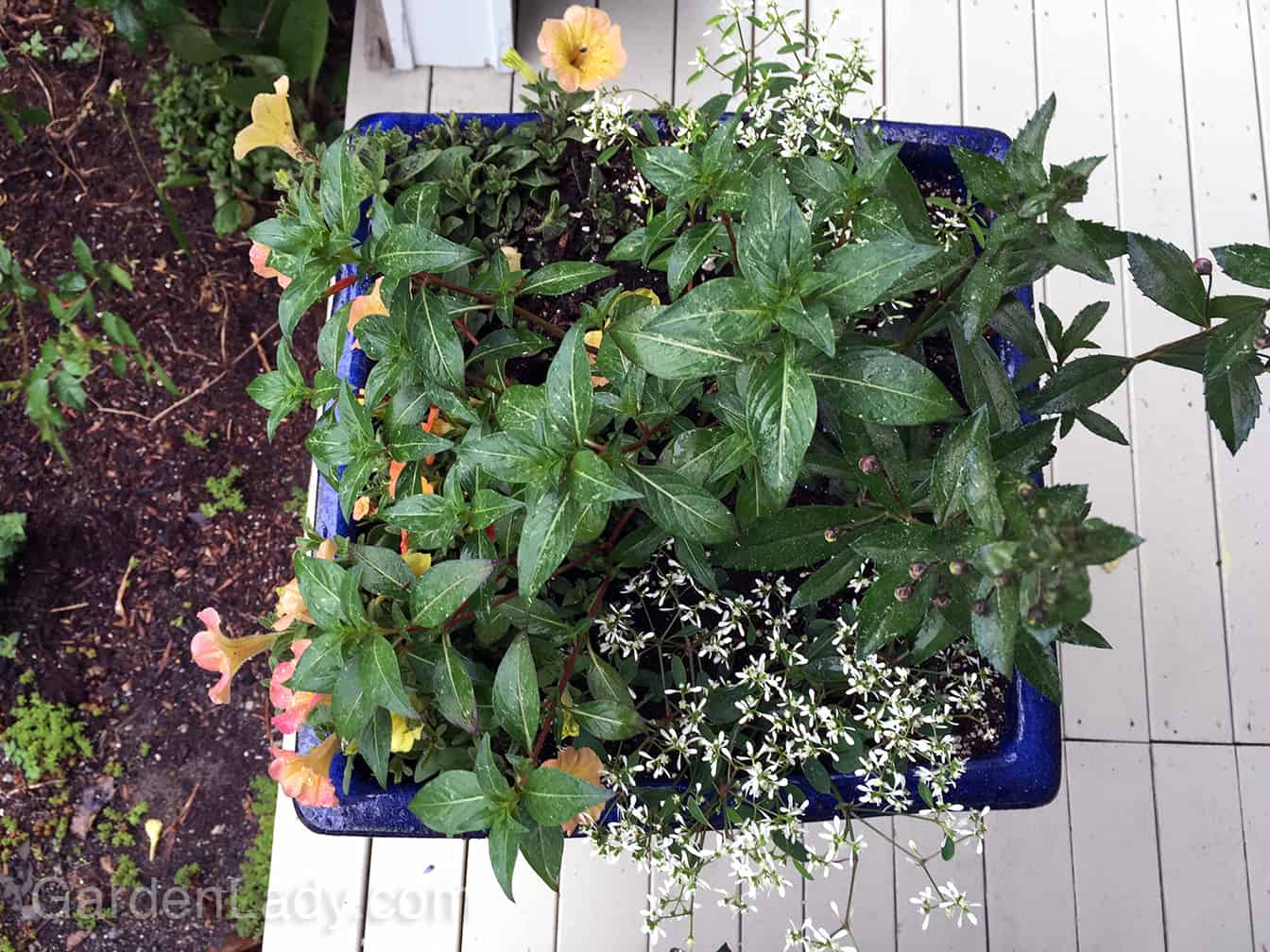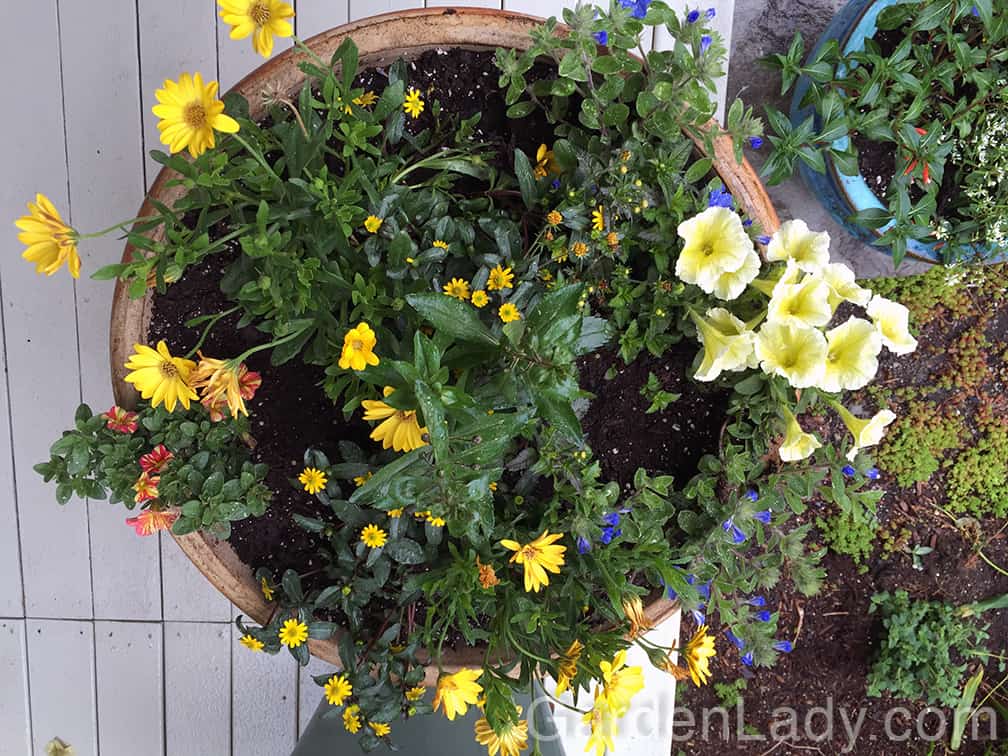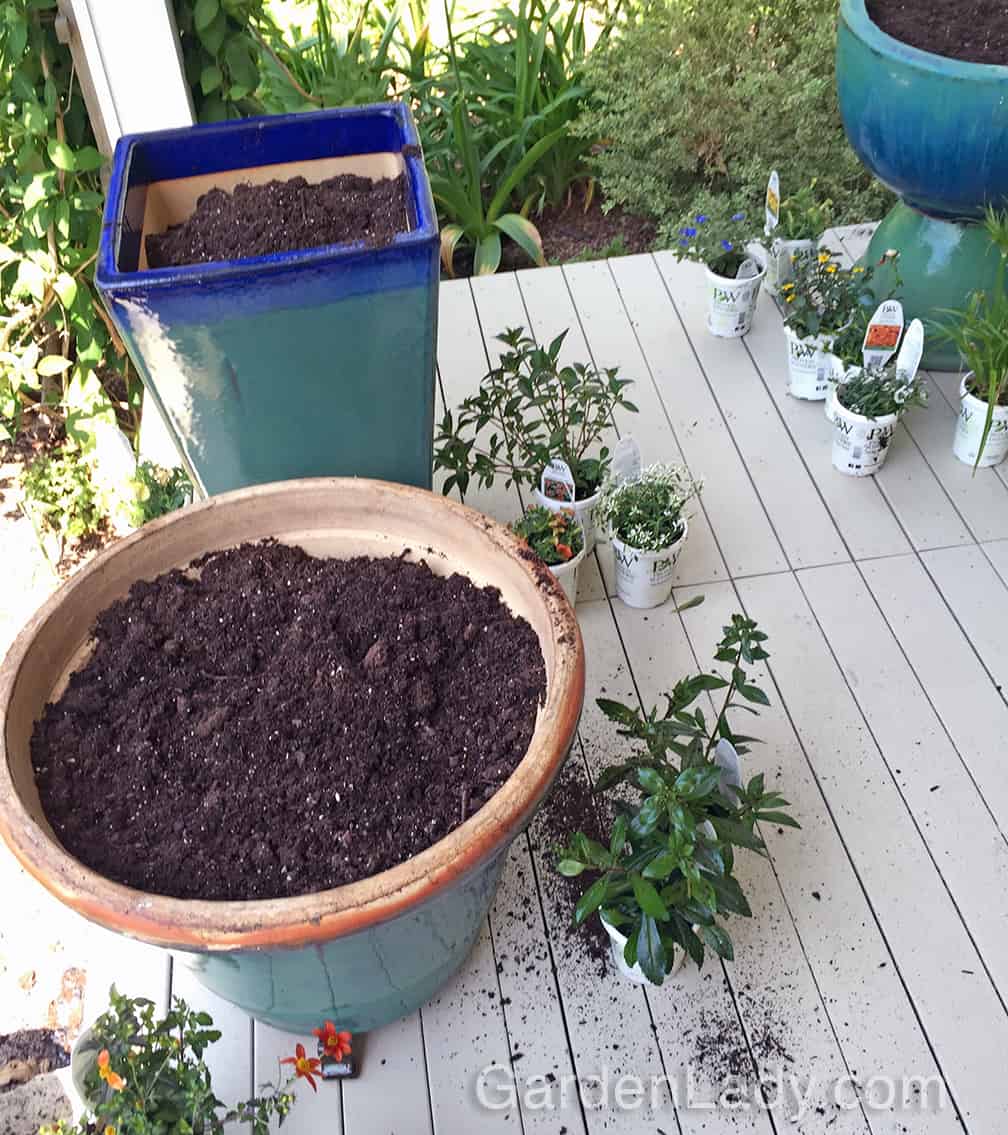One of the most enjoyable aspects of early summer is designing displays of annual flowers in containers. Today’s post is about the pots I’ve planted at the entry to the house. Every year I try something different here…a new color scheme, a different collection of pots, or a particular theme. This year I’m going with a sense of place (Cape Cod) and plants from Proven Winners.
Some of the Proven Winners plants used in this display were sent to me by the PW company, and others I got at the garden center. Some are new to me, and others are dear old friends. Here are the varieties I’ve planted, and how I go about designing and planting a container.

I gathered all my possible ingredients on the step. I knew I wanted to use the green pots this year that have a touch of blue on them, and that there will be a few seaside references such as the clam basket of balls and glass floats and the lighthouse.
Last year I planted the rain chain with succulents, but this summer I’m leaving it empty – even as it is, this is a wonderful vertical piece from Cowdawg Creations.
The first thing to consider when planting pots is where the container is going to be placed. That will determine what plants you can use, since you’ll want to use shade-lovers in darker areas and those that do best in sun in those bright locations.

This pot is going to be on a hot stone step that gets direct sun from 11 AM until 5 PM. So for this pot I used heat-tolerant sun lovers: Euphorbia ‘Diamond Delight’, Cuphea Vermillionaire, Sanvitalia Sunbini, Portulaca Mojave Tangerine, and Evolvulas Blue My Mind.
Next, go for elements that contrast and those that repeat. Whenever possible you want both repetition and contrast in colors, shapes and textures.

In this pot the Euphorbia Diamond Frost has a fine texture which contrasts with the other plants heavier leaves and flowers. The shape of the Petunia and Calibrachoa flowers repeat each other, and their coloration (yellow with a blush of coral) is similar on these Supertunia Honey and Superbells Tropical Sunrise. But their round flower shape contrasts with the Euphorbia, Cuphea and Angelonia Angelface Wedgewood Blue blooms. The shape of the plants also vary: Angelonia will have a tall shape, the Cuphea, Calibrachoa and Euphorbia a rounded shape, and the Supertunia Honey will cascade down over the pot and onto the porch.

This pot contains three plants that repeat the yellow color (Supertunia Limonchello, Osteospermum Bright Lights Yellow, and Sanvitalia Sunbini) with different size flowers. Other annuals in this pot will have contrasting colors and shapes when they come into bloom. In addition to the yellow, there is blue Evolvulus Blue My Mind and Angelonia Angelface Blue and coral in the Calibrachoa Superbells Tropical Sunrise.
Here are some tips that I’ve found helpful in potting up containers that last well all summer:
- Fill the container completely to the bottom of the pot, and don’t cover drainage holes. That means no rocks, shards, coffee filters or screening in the bottom of the pots. (Think you need rocks “for drainage? You need to read Coffee for Roses instead!)
- Use new potting soil…if the container is large or tall you might recycle some of last years mix in the bottom third of the pot, breaking it up if there are still roots there, and throwing in some fertilizer. But for the top 2/3 of the pot use fresh potting mix.
- Mix together equal parts of a time-release synthetic fertilizer and organic granular fertilizer and work this into the potting soil before you plant.
- You don’t have to loosen, cut or “tickle” the bottom roots on most plants, especially those grown in pots as these Proven Winners were. This practice is useful on really, really congested, root-bound plants but it’s gotten out-of-hand and can be more disruptive to potted plants than leaving them alone.
- For pots that are going on decks and porches, using “pot feet” allows better air circulation and ease of washing.
- Filling pots:
 I fill the pot to near the top, and don’t pack it down much, but let the water settle things in. Since the soil is so loose I can easily push it aside to put each plant in place. After they are all in the pot I fill in any gaps with spare potting soil, knowing that over the course of several days and waterings the potting soil will settle in and sink down a bit more. I think that it’s a mistake to push the soil in hard, or to press the potting mix in around the plants since this compresses the air out of the mix and makes it harder for the plants to grow roots quickly.
I fill the pot to near the top, and don’t pack it down much, but let the water settle things in. Since the soil is so loose I can easily push it aside to put each plant in place. After they are all in the pot I fill in any gaps with spare potting soil, knowing that over the course of several days and waterings the potting soil will settle in and sink down a bit more. I think that it’s a mistake to push the soil in hard, or to press the potting mix in around the plants since this compresses the air out of the mix and makes it harder for the plants to grow roots quickly.

My Proven Winners Porch, newly planted! I can’t wait to post more photos in two or three weeks. Given the fertilizer and room to spread their roots, these annuals will grow quickly and will start to put on a colorful show soon. More to follow!
Here is a complete list of the plants I used this summer. I was staying in the blue/white/yellow/coral/orange color range. Angelonia Angelface Wedgewood Blue, Euphorbia Diamond Frost and Diamond Delight, Cyperus Prince Tut (a smaller version of King Tut! Great fun), Calibrachoa Superbells Tropical Sunrise, Osteospermum Bright Lights Yellow, Sanvitalia Sunbini, Evolvulus Blue My Mind, Nemesia Sunsatia Blood Orange, Bidens Campfire Fireburst, Mecardonia Golddust, Cuphea Vermillionaire, Petunia Supertunia Limoncello, Portulaca Mojave Tangerine, Petunia Supertunia Honey, and Lobularia Snow Princess. On the ground in front of the porch is Verbena Royale Peachy Keen. To see all of these plants, go to the Proven Winners website and put these names in their search box.

This great read! Your deck lovely. Love pots of one hue. I am retired and we rent. Gardening is pots on our 7′ by 9 ‘ deck. AM, sun, east, Central Mass. We have bad luck with petunias, – mildew, pest etc. Looking at lemoncello petunia. What do you suggest.? Grow them with lots of room?
Thanks for your consideration. Beth Stinson
Elizabeth – all of the Supertunias from Proven Winners should be given room, although some stay more mounded that others. But if you want color that will thrive in morning sun, try Browallia Endless Illumination, New Guinea Impatiens, the yellow Mandevilla Vine, Solenia begonias, Persian Shield, and the lime-green sweet potato vine.